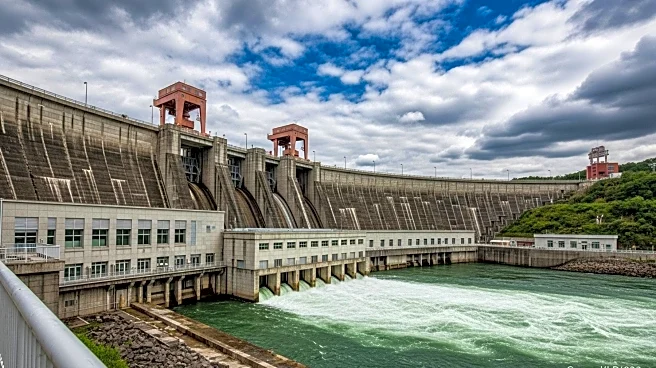What's Happening?
Ethiopia has completed the construction of the Grand Ethiopian Renaissance Dam (GERD) on the Blue Nile, set to officially launch on September 9, 2025. The dam, Africa's largest hydroelectric project, aims to generate over 6,000 megawatts of electricity, positioning Ethiopia as a major power exporter. The dam's construction has been a source of contention among the 11 countries sharing the Nile waters, particularly Egypt and Sudan, which lie downstream. These countries have expressed concerns over the dam's impact on their water rights and supply, citing historical treaties that favor their water allocations. Despite interventions from the African Union and the US, no binding agreement has been reached regarding the dam's operation and water allocation.
Why It's Important?
The completion of the GERD represents a significant shift in regional power dynamics, potentially altering water distribution among Nile Basin countries. For Ethiopia, the dam promises economic growth and energy independence, crucial for its development. However, Egypt and Sudan view the dam as a threat to their water security, which is vital for their populations and agricultural sectors. The lack of a binding agreement raises concerns about future diplomatic tensions and regional stability. The situation underscores the challenges of balancing development needs with equitable resource sharing in transboundary water management.
What's Next?
With the dam's inauguration imminent, Ethiopia, Egypt, and Sudan face critical decisions on managing the Nile's waters. Ethiopia's Prime Minister has emphasized the dam's potential for regional cooperation, but Egypt and Sudan may pursue further diplomatic or legal actions to protect their water interests. The international community, including the US, may continue to mediate discussions to prevent escalation. The dam's operation will be closely monitored for its impact on downstream water flow and regional relations.
Beyond the Headlines
The GERD highlights broader issues of colonial-era treaties and their relevance in modern transboundary water disputes. The situation raises ethical questions about resource allocation and the rights of upstream countries. It also reflects the growing importance of water security as a national security concern, potentially influencing future policy and international relations in the region.











